-
American Goldfinch (1)
-
American Robin (1)
-
Baltimore Oriole (1)
-
Blue Jay (1)
-
Bluebirds (1)
-
Carolina Wren (1)
-
Chickadee (1)
-
Ducks (1)
-
Starling and House Sparrow (1)
-
House Finch (1)
-
House Wren (1)
-
Hummingbirds (5)
-
Northern Cardinal (1)
-
Northern Mockingbird (1)
-
Nuthatch (1)
-
Owls (3)
-
Tufted Titmouse (1)
-
Woodpeckers (6)
A Hot Mess! Squirrel Resistant Bird Seed!

Are you tired of furry critters gnawing on your bird seed? Are you tired of filling feeders on a daily basis just so the local squirrel family can clean them out again and again? Then welcome to the world of bird feeding - and trust me, you are not alone!
I wonder how many hours and brain cells have been consumed trying to come up with ways to keep those pesky varmints out of our backyard bird feeders. The problem is - they are so smart! And, well, sorta cute too when you really get down to it. However, these habits of gobbling up bird feed and occasionally wrecking a feeder have got to stop! Today I want to explore the sometimes futile practice of squirrel determent. I’ll touch on a few options but I want to concentrate on the hot pepper method.
One of the more popular and fairly easy methods of keeping squirrels out of your bird seed is to use a “hot pepper” product. There are many of these on the market today sold by a variety of companies. The choices include:
- Bird seed pre-blended with a hot pepper coating.
- Bird seed cylinders & cakes with a hot pepper coating.
- Bird suet with hot pepper added to the mix.
- Liquid hot pepper in bottles of various sizes that you can add to your regular seed.
There are several options out there for purchasing “hot seed”, ready to use out of the bag. JCs Wildlife sells a hot seed made by Cole’s Seed called “Hot Meats”. This product has sunflower hearts coated with safflower oil and liquid habanero chili peppers. This bagged seed can be used in any type of bird seed feeder with no modifications needed. It can also be mixed in with your existing non-hot seed if desired.
Seed cylinders and cakes are becoming more and more popular in backyards across the country. They are simple to use, economical and don’t leave much of a mess. The hot varieties of these products are probably the best sellers. JCs Wildlife sells a hot seed cylinder made by Mr. Bird in Texas. These hot cylinders have been in short supply ever since the pandemic hit, bringing with it shipping and staffing woes. We are, however, starting to see these returning to a more normal status in the marketplace within the past few months. They can be found here on our website: 
Hot pepper suet cakes are yet another type of squirrel-resistant bird food. A hot pepper sauce is simply incorporated into the suet mix and then molded into a cake. Pine Tree Farms makes a Never Melt Hot Pepper Cake.
Lastly, for the brave do-it-yourself folks out there, there is a “hot liquid in a bottle” option. Cole’s makes a very popular product in this category, aptly named Cole’s Flaming Squirrel Seed Sauce. This hot sauce can be added to your existing seed by stirring it up in a bucket or container with an appropriate amount of bird seed. You may want to start out by adding a small amount, then test the waters with your squirrel friends to see what happens. A stronger mixture can be applied if necessary.
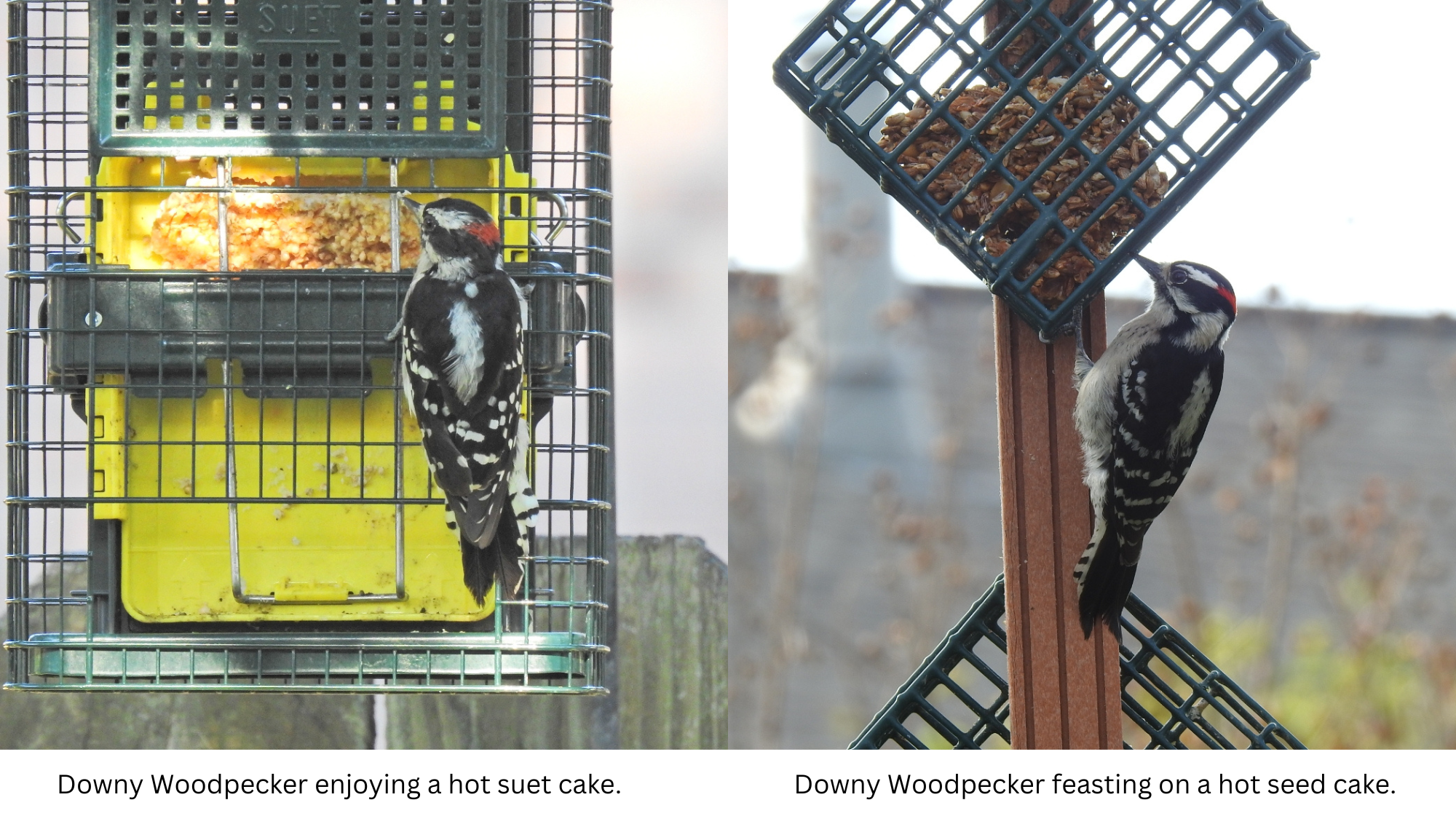
Now let’s backtrack a bit. The products listed above are HOT. I mean, really HOT. There are those out there who may not want to subject their squirrel friends to a dose of this heat, sending them scampering to the nearest bird bath for some relief. Then again, some may find this a bit humorous in a squirrel-sadistic sort of way. For those seeking a cooler approach to their squirrel problems, here are some non-flaming options:
- Squirrel Baffles - If you have your bird feeder mounted on a pole a fair distance away from a fence or tree branch, adding a baffle can keep squirrels from climbing up the pole and accessing the feeder. JCs Wildlife offers a complete line of patented Squirrel Stopper pole systems and baffles to fit your needs!
- Caged Feeders - This option is basically a bird feeder in a steel cage. The cage openings are small enough to keep squirrels out, while allowing most small songbirds access to the seed. We offer a caged suet/seed cake feeder.
- Safflower Seed - This can have a two-fold benefit. Offering Safflower Seed in your yard not only helps with squirrels, but European Starlings and Common Grackles don’t care much for it either. JCs offers Safflower seed on our website.
- Name-Brand Squirrel Proof Feeders - I would be remiss in my list if I didn’t mention our friends at Brome Bird Care. Brome offers a full line of patented, squirrel-proof feeders in a variety of applications and sizes. These are high-quality, durable feeders that are supported by Brome’s “Lifetime Care” program.
All of the options listed above are solid. But specialty type feeders tend to be a bit pricey. And while cages might keep the squirrels out of your bird seed, they will also limit the bird species visiting your feeder. Birds like Northern Cardinals, Blue Jays and Red-Bellied Woodpeckers for instance, will likely not be able to get into the cage. Safflower also limits the species at the feeder, as some birds (like woodpeckers) don't care for it. And while baffles can be effective, they must be used correctly and in the right setting in order for them to work.
So…circling back to the hot stuff… Let’s dig down a little deeper.
What makes the hot seed HOT? The quick answer is capsaicin. This is the active ingredient in all hot peppers that causes the mouth to burn and the belly to rumble. The greater the concentration of capsaicin, the hotter the pepper. It is an interesting enough phenomenon that a man named Wilbur Scoville created a scale back in 1912 to rank the heat. And you guessed it, it’s called the Scoville Scale. Which reminds me of a pizza I once tried at a local joint called the "Screaming Scoville". Notice I said ONCE. Those of you who are connoisseurs of all things HOT will know all about Scoville. For the rest of you, please consult the chart below. The Carolina Reaper claims the top prize in hotness, while the Bell Pepper is in the basement at a heat unit rating of zero. For those of you who think Jalapenos are hot, please consider their rank on the chart - a mere 2,500-8,000 heat units at 5th from the bottom. Oh my… Now let’s consider that the active ingredient in Cole’s hot seed is “liquid Habanero Chili pepper” extract. The Habanero is over 10X hotter on the Scoville Scale than the lowly jalapeno. Ergo, that seed is flippin’ HOT! Granted, Mr. Bird’s Flaming Hot Feast product ingredients simply state “Capsaicin”. So who really knows just how hot some of this stuff is. My guess is that bird seed is not held to the same FDA requirements as human fit-for-consumption products. From the research that I have done and the hot bird seed that I have fed, it appears that most of these items contain either Habanero or Cayenne chili juice, or extract. So again, they’re HOT!

Hot bird seed products have been on the market since the early 2000’s. They are applied to seed in either powder or liquid form. Remember I joked earlier about the FDA thing? Well let’s just say that not all hot stuff is created equal. For instance, if you were to put 2 hot seed cylinders from 2 different batches side-by-side on a table for comparison, I would almost bet money one will be more orange than the other. If you get one that’s a little lighter in color, I would tend not to worry. The hot, orange color can fade a little over time, but this doesn’t mean the bird seed is losing its punch. And again with my musings, but I’ll bet the mixes used to treat the seeds can vary a bit from batch to batch.
Now a question that some concerned birders have been asking for 20 years, “Is this stuff safe for my birds?” From what I can ascertain, there is no empirical, scientific evidence that “hot stuff” will harm your backyard feeder birds. Some will even argue that there are health benefits to birds who eat this type of seed. So why does a bird like it and a squirrel doesn’t? Simply put, birds don’t have the same taste receptors that us mammals are blessed with, or cursed with, depending on your perspective. In humans (and other mammals), capsaicin causes a burning sensation in certain nerve endings and mucous membranes. It also causes an increase in the production of gastric acid in the stomach. Depending on how severe these reactions are, some people like hot stuff, while others tend to stay away from it. But these reactions do not occur with birds. In fact, some studies point to a symbiotic relationship that has been established throughout the years in nature. Birds are actually attracted to some pepper plants and will eat the fruit and its seeds. These seeds will in turn pass directly through a bird's digestive system unscathed. Birds eat peppers, birds fly off, birds release the seeds through their normal disposal systems. Ta-da, plant species propagation at its finest!
While we’re discussing benefits, here is a list of the possible benefits for humans who consume hot peppers:
- Reduces blood pressure
- Relieves arthritis pain
- Can lower the risk of cancer - especially prostate cancer
No one really seems to know yet whether or not hot peppers are actually GOOD for birds, as they can be for humans; but some seem to think there are certain benefits for our avian friends as well.
The last thing I’d like to touch on here is important. Perhaps I didn’t save the BEST for last, but I saved the most important - a “Safety Speech” and a disclaimer. First the disclaimer. Nothing is 100% in nature. Even the best squirrel proofing methods are not going to allow all of the birds you want to see at your feeders while thwarting the efforts of the neighborhood squirrels. It just ain’t gonna happen. I will venture to say that most of these methods, as well as the “hot stuff” are about 80%-90% effective. A quick story about my niece comes to mind. She moved into a duplex adjacent to a city park and wanted to feed birds. She purchased a window feeder and mounted it on the park side of her apartment. Yep, squirrels found it. She decided to try a hot seed mix. Squirrel problem ALMOST solved. At least one squirrel in the park-pack didn’t get the memo about not liking the hot stuff. Her fix? Apply the Cole’s Flaming Squirrel Seed Sauce to the already hot seed. Yep, that did the trick. But really? In addition to the disclaimer comes the SAFETY warning. If you mix your hot seed yourself using a sauce or powder - BE CAREFUL! While hot peppers can be beneficial, they can also bring you some great discomfort. Think pepper spray, which contains capsaicin extracts from chili peppers. Make sure to wear gloves; and even then, wash your hands thoroughly after you’re finished. This is also true when handling ANY of the hot seed, cylinders, cakes, etc. that you might purchase to use in your feeders. Try not to touch them at all. And always wash your hands after putting them out, taking extra care not to touch your eyes or any other sensitive areas.

Well, there you have it - the hot mess, as it is. I have used a version of all of these products in the many years I have been feeding birds, and I have found they all work very well. If you choose to have mercy on your squirrels, there are non-hot options out there. If you choose to use the hot seed items, enjoy - but be extra careful and take the necessary safety precautions. And if you’re still feeling sorry for the squirrels, try offering them some corn or peanuts in a corner of your yard where there aren’t any bird feeders. This might just keep them happy and out of the heat!

No comments
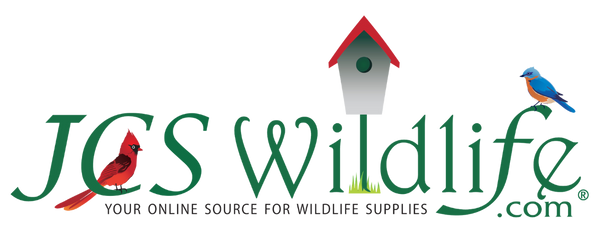
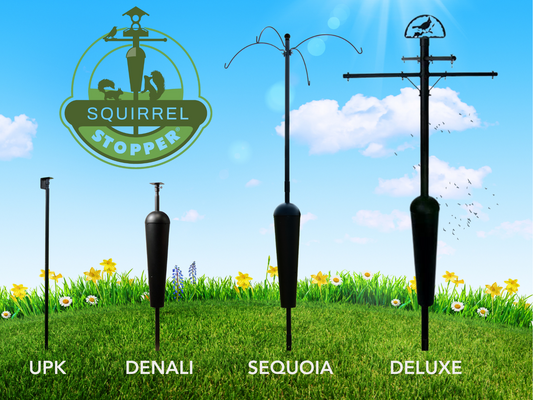
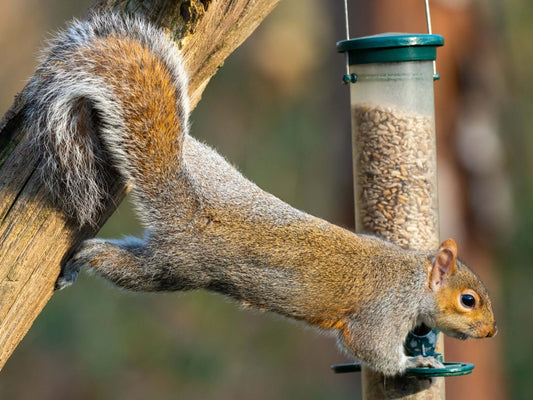
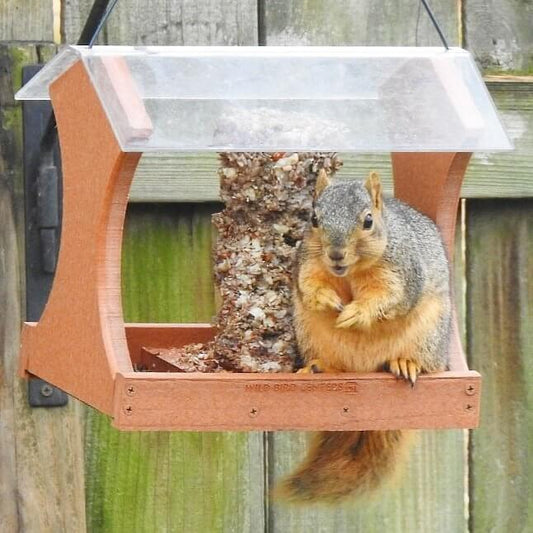


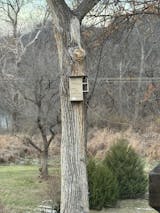
0 comments